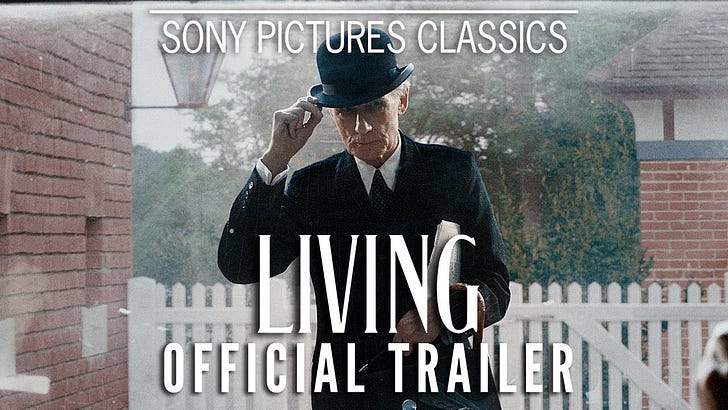Living was a bit of a strange film, I thought. Mildly entertaining, and slow to the point of going backwards at times, it was saved by some cracking performances from Nighy and the rest of the cast.
Based on Akiro Kurosawa’s film, Ikuru, it’s the tale of an old man and a playground. A mediation of life, death and being trapped in a bureaucratic machine all your life.
Nighy’s character, Mr Wilson, is established as a stern and ruthless cog in the machine of City Hall in London, which seems to delight in sending well meaning people in frustrating circles around their many departments. But barely has this been established when our hero is off to the doctors to be told he only has a few months to live.
At this point he vanishes from work, although, apart from a brief sojourn to the south coast for a day, he still goes to London each day, he just doesn’t seem to go into the office for a few weeks. Quite why no-one in the office questions this is a bit of a mystery. Thankfully, it’s the 1940s, so everyone smokes and no-one seems (or is allowed) to care much. Stiff upper lip and all that.
He conveniently meets up for the occasional dinner with a young lady from the office who has somehow managed to quit her job with no notice. He confesses to her (eventually) what he’s up to, and that he can’t quite bring himself to tell his own son and daughter-in-law, whom he lives with, about his pending mortality.
And then he dies, two-thirds of the way through the film, leaving the rest of the cast to reminisce about how he’d returned to work a new man, ready to take on the ridiculous pedants who populate City Hall, and not take no for an answer.
It was a really odd structure and I can’t help feeling it was a little contrived just to be different. It could have easily been told as a linear story and the denouement of his death at the end would have perhaps had a bit more punch. I’ve not seen the original Kurosawa film, I assume this has the same structure.
The other quirky choice they went for was to shoot the whole thing in 4:3 ratio, which sort of gave it that old-time feel, but some of the framing felt out of kilter at times, as if they weren’t sure what the best shot was.
There is one sequence, at the dinner table where Bill is sat on the left, daughter in law in the middle and son on the right. Bill and the son felt right in the frame, but in the shots of the daughter, she felt too low and I noticed some of the audience’s heads bobbing up and down to track the characters as it cut left and right.
I don’t mind a nice slow scene now and again to allow the actors time to breathe some life into the story, but some scenes were a little too slow at times. The scene where the son asks the ex-employee if she knew his father was dying went on waaaaay too long, despite the actors’ best efforts to hold it all together with some great acting.
But these are relatively minor quibbles. The film is still quite affecting and works as a whole, just an unusual one. Worth a watch if you like good acting and quirky storytelling.




